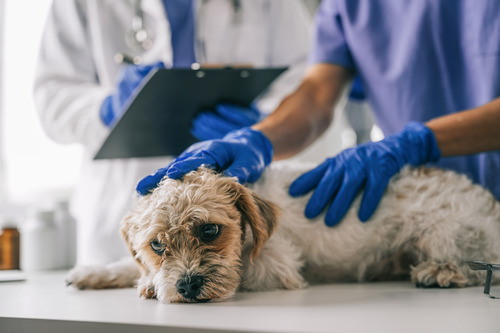Dealing with a dog’s upset stomach can be challenging for any pet owner. It’s important to understand the symptoms and know when it’s time to seek professional help. In this blog post, we’ll explore the signs of digestive distress in dogs and outline the steps you should take to ensure your pet receives the proper care. Remember, while some stomach issues may resolve on their own, others require immediate attention from a veterinarian. If you’re concerned about your dog’s health, contact Montgomery Veterinary Associates on Vaughn Road at (334) 271-1003 or Carter Hill at (334) 269-2508, or request an appointment online.
Common Signs and Symptoms of a Upset Stomach in Dogs
When your dog has an upset stomach, several symptoms might appear. These include:
- Vomiting
- Diarrhea
- Lethargy
- A loss of appetite
- Signs of discomfort like whining or abdominal bloating
If these symptoms persist, it’s essential to contact a veterinarian to rule out more serious conditions.
When to Seek Veterinary Care
It’s crucial to know when symptoms are severe enough to require professional help. Persistent vomiting or diarrhea, signs of dehydration, blood in vomit or stool, or any changes in behavior mean it’s time to consult with a veterinarian. Quick action can prevent more severe health issues and ensure your dog’s quick recovery.
Steps to Take If Your Dog Has an Upset Stomach
Contacting Your Veterinarian
The first step in caring for a dog with an upset stomach is to consult with a veterinarian. They can provide guidance based on your dog’s specific symptoms and history. At Montgomery Veterinary Associates, we are ready to help you at either of our locations: call us on Vaughn Road at (334) 271-1003 or on Carter Hill at (334) 269-2508.
What to Expect During the Vet Visit
During the visit, your vet will likely conduct a physical examination and may require diagnostic tests such as blood work or X-rays to determine the cause of the stomach upset. Understanding the root cause is essential in prescribing the right treatment, which may include medication, dietary changes, or more specialized care depending on the severity of the symptoms.
Preventing Future Stomach Issues in Dogs
Importance of a Balanced Diet
Feeding your dog a balanced, appropriate diet is key to preventing stomach problems. Discuss your dog’s nutritional needs with your veterinarian to ensure their diet supports their overall health and digestive comfort.
Regular Veterinary Check-Ups
Regular check-ups can help catch and address potential health issues before they become serious. Ensuring your dog has routine veterinary visits is a proactive way to maintain their health and prevent issues related to the digestive system.
Caring for Your Dog’s Digestive Health
Watching your dog suffer from an upset stomach can be distressing, but understanding the signs and knowing the appropriate actions to take can help alleviate their discomfort. Whether it’s making dietary adjustments, understanding when to seek veterinary help, or ensuring regular health checks, the steps outlined here will help you manage your dog’s digestive health. For expert advice and compassionate care, contact Montgomery Veterinary Associates at our Vaughn Road or Carter Hill locations, or book an appointment online. Your dog’s health is our top priority, and we’re here to provide the support and care your pet needs.






